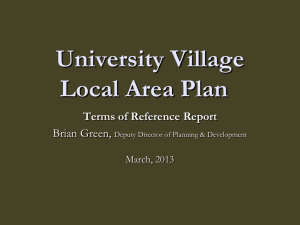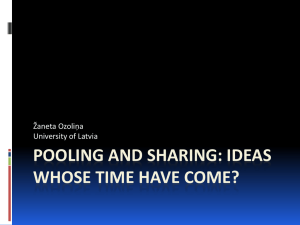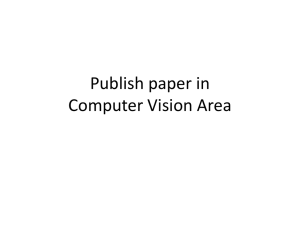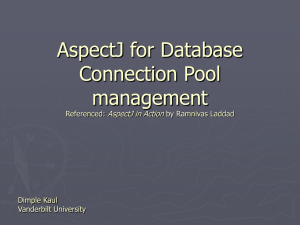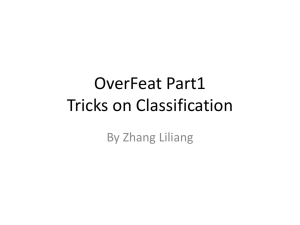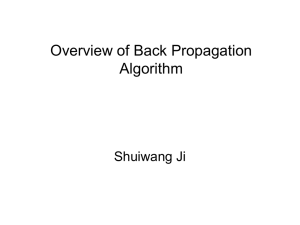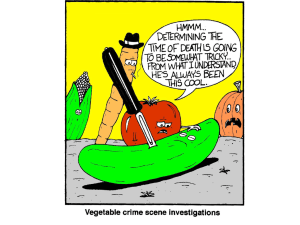slides pptx - Stanford AI Lab
advertisement
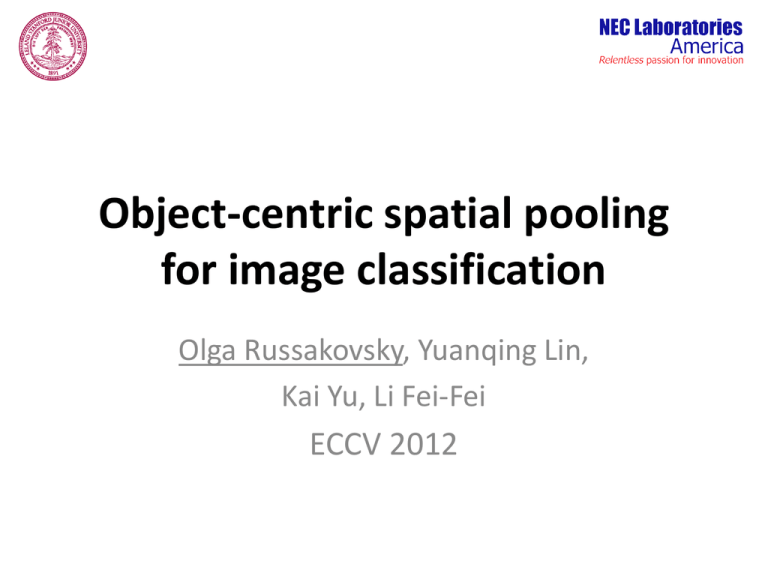
Object-centric spatial pooling
for image classification
Olga Russakovsky, Yuanqing Lin,
Kai Yu, Li Fei-Fei
ECCV 2012
Russakovsky et al. ECCV 2012
Image classification
Testing:
Training:
Does this image contain a car?
cars
cars
not cars
Russakovsky et al. ECCV 2012
Proof of concept experiment
Testing:
Training:
Does this image contain a car?
cars
not cars
Russakovsky et al. ECCV 2012
Proof of concept experiment
Testing:
Does this image contain a car?
Build an image
classification system
PASCAL07 val, 20 classes,
DHOG features, LLC coding 8K codebook,
1x1,3x3 SPM, linear SVM
Training:
cars
not cars
Full images
Cropped objects
52.0 mAP
69.7 mAP
Russakovsky et al. ECCV 2012
Inferring object locations for classification
Testing:
Does this image contain a car?
Challenges:
1. Weakly supervised localization during training
2. Inferring inaccurate localization will make
classification impossible
Training:
cars
not cars
Russakovsky et al. ECCV 2012
Outline
Object-centric spatial pooling (OCP) image representation
Training the OCP model as a joint image classification and
object localization model
Results
• Improved image classification accuracy
• Competitive weakly supervised localization accuracy
Russakovsky et al. ECCV 2012
Image classification system
Image
Low-level
visual features
DHOG features,
LLC coding 8K codebook
.3
1
.2
-.5
…
Classifier
Image-level
representation
Model
Linear SVM
Yes
Result
Russakovsky et al. ECCV 2012
Standard representation: SPM pooling
The Spatial Pyramid Matching (SPM) approach forms the image
representation by pooling visual features over pre-defined coarse
spatial bins.
≠
SPM-based pooling results in inconsistent image
representations when the object of interest appears in
different locations within the image.
Russakovsky et al. ECCV 2012
Object-centric spatial pooling
We propose an object-centric spatial pooling (OCP) approach
which
(1) localizes the object of interest, and then
(2) pools foreground visual features separately from the
background features.
=
Russakovsky et al. ECCV 2012
Object-centric spatial pooling
We propose an object-centric spatial pooling (OCP) approach
which
(1) localizes the object of interest, and then
(2) pools foreground visual features separately from the
background features.
=
Russakovsky et al. ECCV 2012
OCP training formulation
Given: N images with labels y1…yN ∈ {-1,+1} and no object
location information
Know:
Positive images contain at least one instance of the object
Negative images contain no object instances
Positive examples
Negative examples
Russakovsky et al. ECCV 2012
OCP training formulation
Given: N images with labels y1…yN ∈ {-1,+1} and no object
location information
Know:
Positive images contain at least one instance of the object
Negative images contain no object instances
Nguyen et al. ICCV09
Russakovsky et al. ECCV 2012
OCP training formulation
Given: N images with labels y1…yN ∈ {-1,+1} and no object
location information
Know:
Positive images contain at least one instance of the object
Negative images contain no object instances
Goal: a joint model for accurate image classification and accurate
object localization
Russakovsky et al. ECCV 2012
OCP key #1: limiting the search space
Positive examples
Negative examples
Use an unsupervised algorithm to propose regions likely to contain
an object
• e.g., van de Sande et al. ICCV 2011, Alexe et al. TPAMI 2012
• Recall: > 97%, ~1500 regions per image
• Helps with accurate object localization
Russakovsky et al. ECCV 2012
OCP key #2: using all negative data
Positive examples
Negative examples
Dataset: PASCAL07, 20 object classes
~200 examples from positive images +
~5000 negative images x ~1500 regions per image
=> more than 7M examples
Training: stochastic gradient descend with averaging (Lin CVPR’11)
Russakovsky et al. ECCV 2012
OCP training algorithm
Positive examples
• Predict object location is the full image
Negative examples
Russakovsky et al. ECCV 2012
OCP training algorithm
Positive examples
• Predict object location is the full image
• Learn appearance model
Negative examples
Russakovsky et al. ECCV 2012
OCP training algorithm
Positive examples
• Predict object location is the full image
• Learn appearance model
• Update location estimate
Negative examples
Russakovsky et al. ECCV 2012
OCP training algorithm
Positive examples
• Predict object location is the full image
• Learn appearance model
• Update location estimate
• Re-learn appearance model
Negative examples
Russakovsky et al. ECCV 2012
OCP training algorithm
Positive examples
• Predict object location is the full image
• Learn appearance model
• Update location estimate
• Re-learn appearance model
Negative examples
Russakovsky et al. ECCV 2012
OCP training algorithm
Positive examples
• Predict object location is the full image
• Learn appearance model
• Update location estimate
• Re-learn appearance model
Negative examples
Russakovsky et al. ECCV 2012
OCP training algorithm
Positive examples
Negative examples
• Predict object location is the full image
• Learn appearance model
• Update location estimate
• Re-learn appearance model
Joint model for
image classification and
object localization
Russakovsky et al. ECCV 2012
OCP key #3: avoiding local minima
Positive examples
Negative examples
BAD
• Desired training progression:
…
Russakovsky et al. ECCV 2012
OCP key #3: avoiding local minima
Positive examples
Negative examples
BAD
• On each iteration, slowly shrink the minimum allowed size
• Iteration 0: use full image
• Iteration 1: use only regions with area > 75% image area
• Iteration 2: use only regions with area > 70% image area
• …
Russakovsky et al. ECCV 2012
Recall OCP training formulation
Given: N images with labels y1…yN ∈ {-1,+1} and no object
location information
Know:
Positive images contain at least one instance of the object
Negative images contain no object instances
Russakovsky et al. ECCV 2012
Object-centric spatial pooling
We propose an object-centric spatial pooling (OCP) approach
which
(1) localizes the object of interest, and then
(2) pools foreground visual features separately from the
background features.
=
Russakovsky et al. ECCV 2012
OCP key #4: Foreground-background
• Background provides context to improve classification
Foreground
Background
Russakovsky et al. ECCV 2012
OCP key #4: Foreground-background
• Background provides context to improve classification
• Using a foreground-only model leads to inaccurate localization
Accurate:
Too big:
Russakovsky et al. ECCV 2012
OCP key #4: Foreground-background
• Background provides context to improve classification
• Using a foreground-only model leads to inaccurate localization
• The foreground-background representation is both
• a bounding box representation (for detection), and
• an image-level representation (for classification)
Foreground
Background
Russakovsky et al. ECCV 2012
Outline
Object-centric spatial pooling (OCP) image representation
Training the OCP model as a joint image classification and
object localization model:
1. Limit the search space
2. Train with lots of negative data
3. Localize slowly to avoid local minima
4. Use foreground-background representation
Results
• Improved image classification accuracy
• Competitive weakly supervised localization accuracy
Russakovsky et al. ECCV 2012
Results
PASCAL VOC 2007 test set, 20 classes
DHOG features with LLC coding (codebook size 8192, k=5) and max pooling
1x1,3x3 SPM pooling on foreground + 1 background bin
Russakovsky et al. ECCV 2012
Results: image classification
PASCAL VOC 2007 test set, 20 classes
DHOG features with LLC coding (codebook size 8192, k=5) and max pooling
1x1,3x3 SPM pooling on foreground + 1 background bin
Baseline SPM on full image: 54.3% classification mAP
Object-centric pooling (OCP): 57.2% classification mAP
Method aero bicycle bird
boat bottle
bus
car
cat
chair
cow
SPM
72.5
56.3
49.5
63.5
22.4
60.1
76.4
57.5
51.9
42.2
OCP
74.2
63.1
45.1
65.9
29.5
64.7
79.2
61.4
51.0
45.0
horse
mot person plant sheep sofa
train
tv
Method dining dog
SPM
48.9
38.1
75.1
62.8
82.9
20.5
38.1
46.0
71.7
50.5
OCP
54.8
45.4
76.3
67.1
84.4
21.8
44.3
48.8
70.7
51.7
Russakovsky et al. ECCV 2012
Results: image classification
PASCAL VOC 2007 test set, 20 classes
DHOG features with LLC coding (codebook size 8192, k=5) and max pooling
1x1,3x3 SPM pooling on foreground + 1 background bin
Baseline SPM on full image: 54.3% classification mAP
Object-centric pooling (OCP): 57.2% classification mAP
Baseline with 4-level SPM:
OCP foreground-only:
54.8% classification mAP
55.7% classification mAP
Russakovsky et al. ECCV 2012
Results: image classification
PASCAL VOC 2007 test set, 20 classes
DHOG features with LLC coding (codebook size 8192, k=5) and max pooling
1x1,3x3 SPM pooling on foreground + 1 background bin
Baseline SPM on full image: 54.3% classification mAP
Object-centric pooling (OCP): 57.2% classification mAP
Baseline with 4-level SPM:
OCP foreground-only:
54.8% classification mAP
55.7% classification mAP
Foreground-only (green) vs. foreground-background (yellow)
Russakovsky et al. ECCV 2012
Results: image classification
PASCAL VOC 2007 test set, 20 classes
DHOG features with LLC coding (codebook size 8192, k=5) and max pooling
1x1,3x3 SPM pooling on foreground + 1 background bin
Baseline SPM on full image: 54.3% classification mAP
Object-centric pooling (OCP): 57.2% classification mAP
Baseline with 4-level SPM:
OCP foreground-only:
OCP with state-of-the-art
strongly supervised detector
(Felzenszwalb et al.):
54.8% classification mAP
55.7% classification mAP
Russakovsky et al. ECCV 2012
Results: image classification
PASCAL VOC 2007 test set, 20 classes
DHOG features with LLC coding (codebook size 8192, k=5) and max pooling
1x1,3x3 SPM pooling on foreground + 1 background bin
Baseline SPM on full image: 54.3% classification mAP
Object-centric pooling (OCP): 57.2% classification mAP
Baseline with 4-level SPM:
OCP foreground-only:
54.8% classification mAP
55.7% classification mAP
OCP with state-of-the-art
strongly supervised detector
(Felzenszwalb et al.):
56.9% classification mAP
Russakovsky et al. ECCV 2012
Results: weakly supervised localization
PASCAL VOC 2007 train set, 20 classes
DHOG features with LLC coding (codebook size 8192, k=5) and max pooling
1x1,3x3 SPM pooling on foreground + 1 background bin
27.4% localization accuracy
(compare to 28% of Deselaers IJCV12 and 30% of Pandey ICCV11)
PASCAL VOC 2007 test set, 6 classes
aeroplane
bicycle
boat
bus
horse
motorbike
left
right
left
right
left
right
left
right
left
right
left
right
average
detection
mAP
Pandey
2011
7.5
21.1
38.5
44.8
0.3
0.5
0
0.3
45.9
17.3
43.8
27.2
20.8
Deselaers
2012
5
18
49
62
0
0
0
16
29
14
48
16
21.4
Method
OCP
30.8
25.0
3.6
26.0
21.3
29.9
22.8
Russakovsky et al. ECCV 2012
Results: weakly supervised localization
Russakovsky et al. ECCV 2012
Results: classification + detection
PASCAL VOC 2007 test set, 20 classes
DHOG features with LLC coding (codebook size 8192, k=5) and max pooling
1x1,3x3 SPM pooling on foreground + 1 background bin
Russakovsky et al. ECCV 2012
Conclusions
Object-centric spatial pooling (OCP) framework:
Joint model for image classification and object localization
Foreground-background representation
Competitive results
Image classification
Weakly supervised object localization
Important step towards better image understanding
Without the need for additional costly image annotation
Olga Russakovsky, Yuanqing Lin, Kai Yu, Li Fei-Fei.
Object-centric spatial pooling for image classification. ECCV 2012
http://ai.stanford.edu/~olga
olga@cs.stanford.edu
Object-centric spatial pooling
for image classification
Olga Russakovsky, Yuanqing Lin,
Kai Yu, Li Fei-Fei
ECCV 2012
